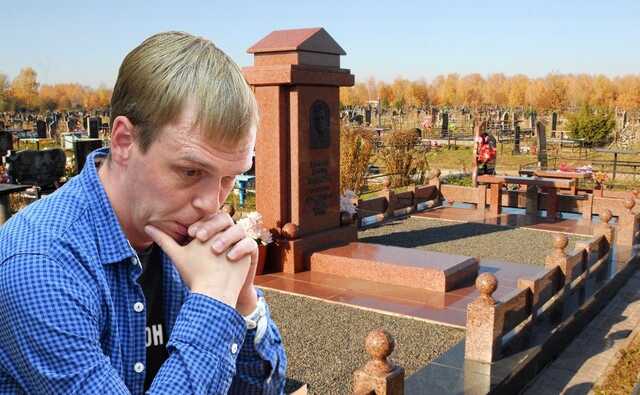Which interests does the proposed law on organizing the funeral industry represent?
Soon, Russian State Duma members will get a draft law about organizing the funeral industry. The document will define “specialized funeral service” and set the rules for its operation. Only legal entities and entrepreneurs with the proper permission will be allowed to arrange a funeral, and the prices for their services will be listed in a public register. Also, employees of funeral agencies will be prohibited from getting information about a person's death and being the first to contact the person's relatives. This measure is meant to stop numerous unauthorized individuals who use psychological pressure to sign expensive service agreements. The bill takes the state budget institution “Ritual” as a model for a funeral company, which gained notoriety after a violent incident at Khovansky cemetery. The directors of “Ritual” are closely linked to high-ranking security officials.
Will the funeral industry be monopolized?
The bill on the organization of the funeral industry in Russia may be presented to the State Duma deputies soon. It was already approved in the first reading during the spring session and is intended to replace the outdated federal law from 1996.
Regarding the burial and funeral business, one of the bill's authors has stated that the new law aims to protect the rights of people who have lost loved ones, establish clear terminology, utilize digital technology, ensure government oversight, and combat illegal activities within the industry.
Under the proposed changes, individuals and legal entities must obtain a permit from the regional authority to organize funerals. Those with permits will be listed in a special register showing the services they offer and their prices. The document also clarifies the roles of government authorities in regulating the funeral sector and defines “specialized funeral service.”
Also, there are plans to make and manage a special list that will have details about graveyards and burial spots, so that people must look after the burial spots and help deal with the issue of ownerless graves. The public lists will also have information about dishonest funeral service providers.
It's important that a separate law will include a ban on giving commercial companies details about someone's death without the family's permission. According to Svetlana Razvorotneva, who is a deputy chairman of the State Duma committee on construction and housing and communal services and co-author of the document, representatives of funeral organizations will be forbidden from contacting the relatives of the deceased first: they can only offer their services after directly contacting the family. Otherwise, they could face fines.
The last point is especially interesting, as it aims to make funeral services as clear as possible and stop the actions of illegal 'black ritual agents' who get personal data and start to scare the relatives immediately after a person's death. There have even been situations where competing 'black ritualists' fought in front of confused customers.
Funeral turned horror
At first glance, the lawmaker's proposal seems very timely: it's definitely time to bring some order to the funeral services market. According to media reports, just in Moscow last year, there were over 500 'shadow' funeral offices that seriously broke the law: their agents bought information about the deceased, forced expensive services, and pressured the relatives psychologically to sign agreements. According to experts, the 'shadow' market's annual revenue is over 15 billion rubles.
“Actually, anyone can provide funeral services today, because there are no clear standards for burials and rules for ritual services,” says Elena Andreeva, who is the executive director of the Union of Funeral Organizations and Crematoria, to Vedomosti.
In reality, this situation leads to truly terrible things. For example, TASS reported on how the body of a Moscow State University professor was lost because of the illegal actions of 'black ritualists': instead of being cremated at the Khovansky cemetery in Moscow, it was taken to Nizhny Novgorod, where it simply disappeared (but was later found and reburied). The situation is also not good in the regions. In one of its articles, the Znak news agency detailed the terrible results of the competition between funeral agencies in the Krasnodar Territory, where mortuary workers disfigure bodies for money, making them unrecognizable and forcing the families to pay to certain offices.
A situation that happened last autumn in Timashevsk, where a funeral agent named Roman Pikalo presented a body wrapped in a sheet to the city administration building, was widely condemned for extorting money for a service that should be free. Representatives of other funeral organizations in similar situations threatened to support Pikalo.
Later it turned out that the White Angel company established a monopoly on funeral services in the city, which signed a contract with the state bureau of forensic medical examination (SME). As a result, the morgue began to work exclusively with the monopolist, refusing to accept bodies from other agencies. The fact that this decision was supported by a material factor is hardly worth specifying.
Paid agents of “black ritualists”
About where and how the “hunt” for potential clients is being conducted, the REN-TV channel spoke, whose correspondents, under the guise of organizing a funeral, turned to the Togliatti City Department for a place in the cemetery, which is provided free of charge by law:
“An employee of the city administration, Yulia Lopatkina, hands our journalist the phone number of a ritual agent named Yury and strongly recommends contacting him. “Be sure to tell him that you are from Yulia Valerievna from the department,” the woman said. As soon as our journalist agrees, he is immediately given signed documents. Agent Yuri is already in place – and immediately to the point: preparing the grave, coffin, wreaths, cross, transport, funeral procession, farewell hall, funeral service. There is no official price list, but Yuri takes out a calculator and sums it up: 99 thousand rubles.
TV channel experts estimate the services of information sellers (in other words, “ringers”) in Tolyatti at 10-15 thousand rubles, in neighboring Samara – at 15-20 thousand. According to TASS, in Moscow informants receive an average of 25- 30 thousand rubles.
Serious administrative connections in the ritual business are indispensable. Not surprisingly, a significant part of the market is controlled by former or current officials. For example, the founder of the company “Pamyat” in Volgograd in the early 2000s was the current deputy of the regional Duma, the chairman of the Committee for Environmental Protection and Nature Management, Irina Solovieva.
According to REN-TV, together with her husband, she began maintaining the archives of city cemeteries, at the same time blocking access to burial sites for competitors: at the gates of the cemetery, the funeral procession was waiting for the Memory hearse, into which it was proposed to transfer the body of the deceased. In case of refusal, relatives had to carry the coffin to the grave on foot.
Despite regular inspections by the Federal Antimonopoly Service and the prosecutor’s office, “Pamyat” is still operating and thriving. True, Solovieva herself officially had to distance herself from the activities of the company, transferring the management of the funeral business to a relative.
Moscow “Ritual” under the “roof” of the security forces


